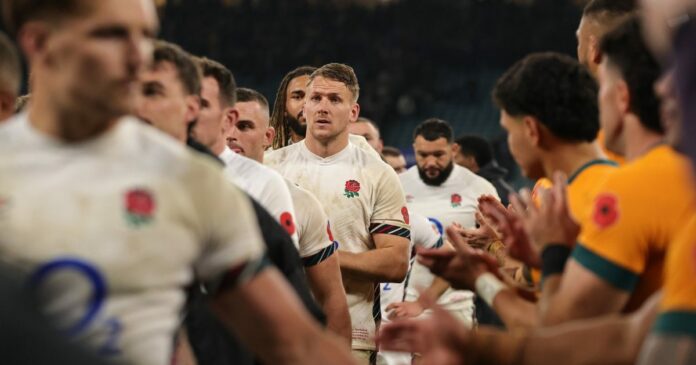
[ad_1]
Friday night lights in Dublin was supposed to provide this weekend’s Autumn Nations Series fireworks, not Saturday afternoon in London. All week Ireland versus New Zealand had been billed as the game not to miss, with England against Australia a next-day sideshow.
What transpired, though, was the total reverse. The stodgy, two-try, stop-start Aviva Stadium affair was spectacularly eclipsed by the 10-try thriller at Allianz Stadium which came with a stark raving bonkers conclusion where the lead changed hands four times from the 68th minute on.
This writer was at both matches in person and for entertainment and atmosphere, there was no debate that the high-tempo action in TW1 was different gravy compared to what slowly unfolded in D4 less than 24 hours earlier.
Karl Dickson explains how referees are refocusing on 50/50 kick contests
Referee Karl Dickson explains how World Rugby referees are now focusing on players giving access to a 50/50 contest under the high ball.

Karl Dickson explains how referees are refocusing on 50/50 kick contests
Referee Karl Dickson explains how World Rugby referees are now focusing on players giving access to a 50/50 contest under the high ball.
It should never have been that way. England were coasting early doors, looking like they were going to win easily, but they blew an excellent 17th minute chance to go three tries up. Tommy Freeman, having galloped away thanks to an exquisite Ben Spencer pop off the floor, lacked the awareness to give a likely try-creating pass to his left on the 22 to Henry Slade.
Throw the ball and it could have been curtains for the Wallabies. Instead, he was tackled to the ground and the rest, as they will now happily tell you in Australia, is gold history. Forget the accusations that next summer’s British and Irish Lions tour will be a dud. It won’t on this delightful evidence which was a timely reminder that Joe Schmidt is a canny Test-level coach.
 Match Summary
Match Summary 
The way the Aussies repeatedly shifted the ball so quickly to the edge after surviving their early crisis was a throwback to 20 years ago when they were a must-watch, box office outfit every time they played.
In Saturday’s revival, they birthed a talent whose skill will potentially transcend the game of rugby union in Australia. Joseph Suaalii was truly a joy to watch on his debut and the Wallabies suddenly have a poster boy to market their sport around. But enough about the visitors, here are the RugbyPass talking points about a crazy loss for England:
El-Abd honeymoon over
Seeing a defence coach struggling to bed in on Steve Borthwick’s watch isn’t a new occurrence. Four tries were conceded in Kevin Sinfield’s first outing in February 2023, while Italy grabbed three 12 months later when Felix Jones came on board.
Now, with Jones working out his notice period remotely and Sinfield given a different brief within the set-up, shutting the door has become a problem for Joe El-Abd. His running score is eight tries conceded in two defeats. Not a good look, particularly with the Springboks next in town next Saturday.
The malaise against the Australians was book-ended by similar failures, England players biting in [Ollie Sleightholme and George Furbank in the first instance, Sleightholme and Marcus Smith in the second), not preventing the slick Suaalii and
Len Ikitau passes and seeing Tom Wright and Max Jorgenson gallop into the corners to score the first and last tries.
In between, George Martin was left badly flat-footed and isolated at a ruck by a slick-footed, try-creating snipe from Tate McDermott to set up Harry Wilson.
Neither Spencer nor Immanuel Feyi-Waboso could deny Jeremy Williams his corner dive-in, and then there was no one at home to head off the emergency of Andrew Kellaway snapping up possession gifted by George Ford’s fluffed pass to Ollie Lawrence and gleefully racing away.
It means the honeymoon has quickly ended for El-Abd, an usher at Borthwick’s wedding some years ago. The French-based specialist needs to quickly eradicate the general level of confusion that exists amongst the players about working with their third different defence coach in less than two years. Starting over again certainly hasn’t been fun.
Losing a late lead… again
Accused last week of speaking meaningless platitudes after the loss to the All Blacks, a defeat that went on to reflect better on England given how they came within the width of a post of winning compared to Ireland’s tame surrender, Borthwick fessed up in his first post-game answer on Saturday that turnovers were blame for England’s latest downfall.
That was a welcome step forward in the head coach making his team accountable, delivering an insight he usually refrains from giving. He also mentioned that the weight of the shirt had been an issue in England teams of the past and easing that burden had been a work-on on his watch.
It’s a vulnerability still hurting them going by Saturday’s latest failure to close out what should have been a win. Twickenham had deliriously erupted with the converted Maro Itoje try supremely converted by Marcus Smith for the 37-35 lead, but those two players who had performed every so well made errors in the ensuing denouement.
Itoje knocked on trying to gather the restart while Smith, after the generally ineffective Slade jumped out of the line, was lured in from the edge to try and double up with Sleightholme on Ikitau when he simply needed to stay out and drift onto Jorgensen.
It’s the fifth time in 13 months that England have messed up keeping a late lead, a dubious list that started with the Rugby World Cup semi-final scrum infringement that handed South Africa their late, late lifeline.
France, New Zealand (twice, in Dunedin and London) and now Australia are other examples of this weakness.
They are not totally inept in this aspect – last spring’s wins over Wales and Ireland were nailed with late-booted scores. But there is definitely a glitch in their psyche when it comes to closing the deal. In a results-are-everything business, it can’t continue.
Operation Ollie
Saturday was very much ‘Operation Ollie Lawrence’. We have been here before with the marauding centre getting left bereft of the possession necessary to get England on the front foot.
Last week’s meagre two possession against New Zealand was a repeat of the infamous 2021 Six Nations opener when he was starved versus Scotland with Owen Farrell at No10.
Smith, the current out-half, was keen to get his colleague more involved and his lovely, early dinked kick through the cover, which was brilliantly regathered by Lawrence, was the genesis for the Chandler Cunningham-South try.
Lawrence, who had 13 on his back but played as a 12 on Smith’s shoulder, was credited with 10 possessions in total on Saturday, adding to the brio of the England attack which had was more of a threat compared to their series-opening effort of seven days earlier.
It helped that the predictability of having Ben Earl as their primary ball carrier was a dependency they moved away from.
Yes, Earl still topped the chart with a dozen carries and his pass was the assist for the day’s opening try, but having the likes of Lawrence, Cunningham-South and Ellis Genge all have 10 carries each varied the point of attack and it delivered ball-in-hand rewards. That was a positive amid the rancour of the late, late loss.
Player Turnovers Lost
1

Henry Slade
3
2

Ollie Sleightholme
3
3

Ollie Lawrence
2
In Jamie we worry
Jamie George is a lovable, well-spoken bloke but is there a debate to be had that the captaincy has diluted the quality of his general play? He was irreplaceable during Borthwick’s first year, his engine going the full distance in several matches, but the length of his involvements has since hugely declined.
He was there for just 53 minutes versus Ireland, 49 away to France, 54, 49 and 52 in the trilogy of fixtures against New Zealand, and Saturday’s appearance was cut short on 51 minutes with England having surrendered an early 15-3 advantage to trail 18-25 by the time of his departure.
The way momentum was lost on Saturday was a poor reflection on his current leadership.
Of course, the guard dog that is Tom Curry was terribly missed following his 23rd-minute exit with concussion, but his departure alone can’t excuse why England became so passive and the next 28 minutes until George exited were ‘lost’ 3-22 with him supposed to be calling the shots and keeping the team composed and connected.
There was a looseness in his play and he looked spent during his final contribution, moving around without effect after a crafty Australian lineout was thrown short to the front and worked from there for the Williams’ try, a move which included George missing a tackle on Angus Bell.
There are plenty of vice-captains with Genge, Itoje and Earl all starting and Ford coming in off the bench, but you surely want your main man in George to be a dominant figure, leading by his actions as well as his words. England aren’t getting that at the moment with George.
[ad_2]
Copyright for syndicated content belongs to the linked Source link


